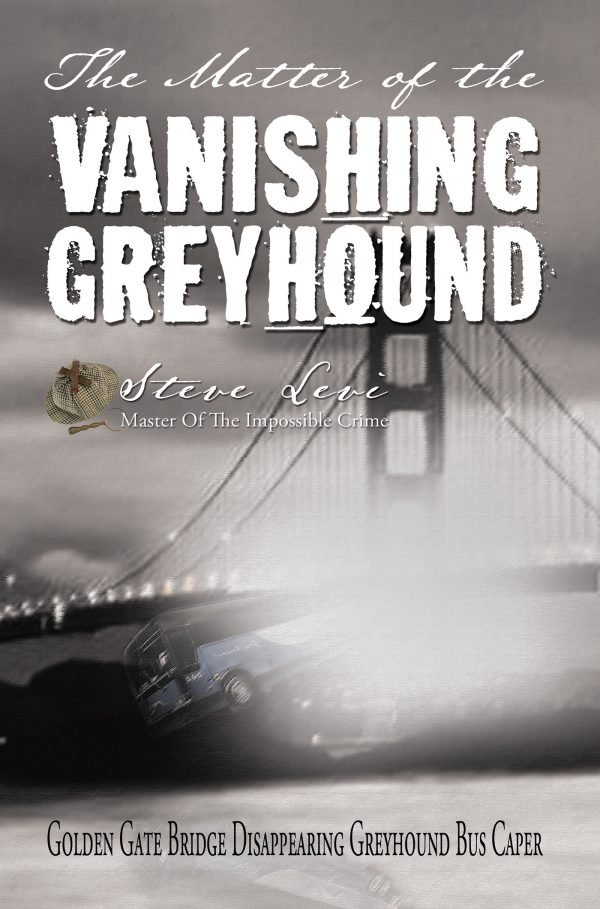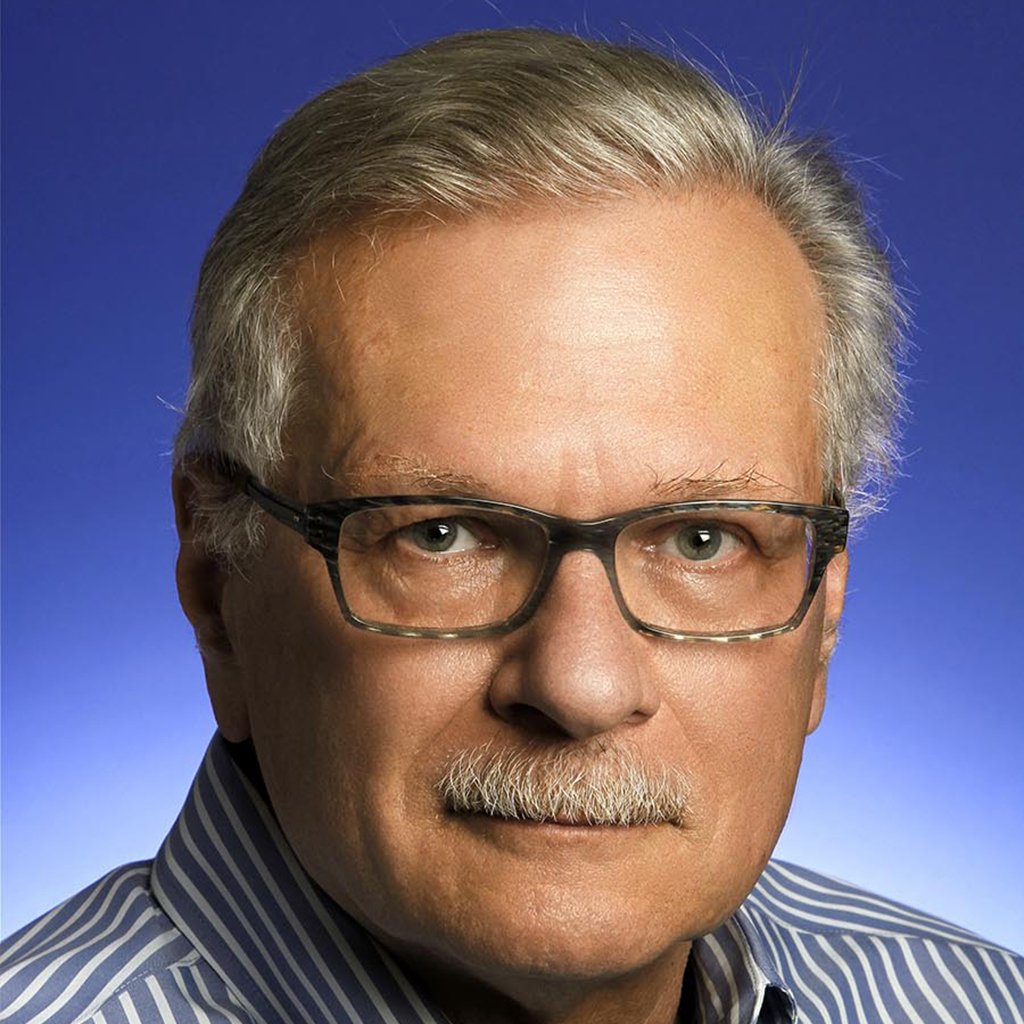The Matter of the Vanishing Greyhound
Golden Gate Disappearing Greyhound Bus Caper
Steven Levi
Master of the Impossible Crime
Chapter 16
Odd it was that a man should be sitting on a park bench beneath Rodin’s Thinker at the Palace of Fine Arts on weekday afternoon in drizzling fog. But there he was, in a black plastic trench coat, braving the perils of a typical San Francisco afternoon of mist and drizzle and rain. Overhead the sky was a solid dark gray and the air had a wet smell.
The man was dressed for the weather. He wore field boots with deep canyons in the soles to allow rainwater to drain away quickly. Above the sheath of the boots and beneath the hem of the raincoat were three inches of Levi’s blue jeans. He wore neoprene gloves, a favorite of skin and scuba divers and a sweatband held his hair in place beneath the black, broadbrimmed fisherman’s hat which allowed the water to drain in rivulets onto his shoulders and back. He was smoking a cigar, the end of which he kept cupped beneath his left palm. His right hand was in his trench coat pocket. The only bit of light color was the man’s silver beard and mustache, which could be distinguishable a block away.
But he wasn’t on the bench long. As soon as Douglas Hopkins came running up, holding his black silk jacket collar up to keep the rain from working its way down his back, the man stood up. Hopkins wore no hat and his light blue pants were in the process of being plastered to his thighs. Even from a distance it was clear Hopkins’ patent leather loafers would be saturated with water before he made it to the park bench.
“Are you going to stand around in the rain?”
“I hope not,” Hopkins pointed toward his car. “Can’t we sit in the car and talk?”
“Not a chance, Hopkins.”
“Why not?”
“Because while we’re standing here, I’ve got a bit of control. In your car,
I don’t know if I’m being bugged.”
“Why would I bug you?”
“To save your ass. Look, Hopkins, the reason I’m not in any hoosegow is because I am very careful. Sitting in someone else’s car is asking to be nailed. Nope. We’ll take a walk.”
Hopkins and the man in the black plastic rain jacket hop-scotched their way over and around the filling potholes in the gravel footpath. Hopkins dashed ahead and made a beeline for the entrance to the art gallery but was drawn alongside the building. The men walked under the false, concrete balcony and rounded the corner into the vaulted hallway. Here they were out of the rain but the wind coursing through the building channel was chilling.
“Let’s make this quick.”
Hopkins shook the water out of his shoes as he flexed his knees in the hallway as though he was running out of time to get to a bathroom. “I don’t have any problem with doing this quickly.”
“So far things have gone according to plan and we are still doing OK. Now comes the tricky part. Making the exchange. Why did you want to meet? The original deal was you were not to be personally involved. You’re only in this for the cash, $1 million. We make the exchange, you get your cut and we disappear. Why do you want back in all of a sudden?”
“Too much is riding on this exchange. If it gets screwy, I’m the one holding the bag.”
“Hopkins, you’re the amateur here. You can’t be trusted to think like a professional. Or act like one. Butt out. You’ve got a good alibi and will have a $1 million by nightfall. Not bad for an Ivy League dropout. All you have to do is stay clear. You’ll get your cut.”
Hopkins was still on edge. “It won’t take long for Noonan to figure out I was the inside man. It’s just a matter of time.”
The man in the trench coat kicked unconsciously at the wet gravel. “So what? The man’s got no proof.”
“I’m the nervous type.”
“No reason to be. And again, by midnight you’ll be one million dollars richer and we’ll be long gone. Any change now is going to screw up the works.”
But Hopkins was obsessed. “There is a good chance English Petroleum is not going to like the idea of making the payment themselves. They’re British, for God’s sake. They don’t do things the American way.”
“Give me a break, Hopkins! They’ve been washing money for their drug friends in South America for a cracking plant in Bogota for years. They’re going to be so happy to get their scrambled serial numbers back they’re not going to bat an eye.”
Hopkins pulled his collar tighter around his throat. Then he scuffed his feet like a frustrated child. “I’m just looking out for me. This entire exchange could go haywire.”
“Hopkins, all you have to do is be around in the shadows when we make the final switch. You get your cash and we go. We shouldn’t even be talking about this. I should not even be here! When we need to make the exchange we’ll be in touch.”
“How are you going to stay clear of Noonan? He’s an unexpected twist. He works alone and could be anywhere. Maybe I should stay with him?”
“We’ve got him covered very well. Wherever he goes, we know. Don’t spend your time worrying about him.”
“Are you tailing him?”
“No. We don’t need to.”
“Are you sure you don’t need me? After all, I . . .”
“Douglas! This is a very tricky time. You’re out of the loop until we make the exchange! Stay public and keep your cell phone on. When we have to make the exchange, we’ll call.” Hopkins tried to say something but he was cut off again. “No! Whatever it is, No! Now let’s go!”
Before Hopkins could respond, the man in the plastic trench coat moved away from the hallway and stepped into the rain. In the next instant the downpour filled his ears with the drumming sounds of raindrops on his hat. He made it to his car, an ivory Ford, without looking back. He made it out of his parking space in the near-empty parking lot without looking back either.
But he did look in the rear vision mirror when he came to a stop where the parking lot disgorged its flow out into the street. There, at the stop sign, he noticed one of the cars in the lot was slowly moving toward him. A questioning look crossed his face for an instant. He edged his head slightly sideways to sharpen the angle of his view in the rear vision mirror. From this vantage point he could see Douglas Hopkins walking dejectedly across the parking lot, oblivious to the two cars. When he returned his view to the car easing up behind him, he registered it was being driven by a black female. When he saw she was talking on a cellular phone, he hesitated for a moment before hitting his left-hand turn signal. Smiling, he spun the wheel and eased out of the lot, fumbling for his cellular phone in his chest pocket. He hit speed dial and put the phone to his ear.
“Yes.” The line connected without a ring.
“I’m made.”
“He’s poison.”
“Appears so.”
“Describe.”
“Purple Subaru station wagon. New, no plates. Hertz sticker in window. Driver a black female, about 35, 5 foot 10, athletic, brown shirt. Speaking on cell phone.”
“Use Route Niner. Repeat, Niner. Recontact in 10.” In the next instant the cellular went dead.


